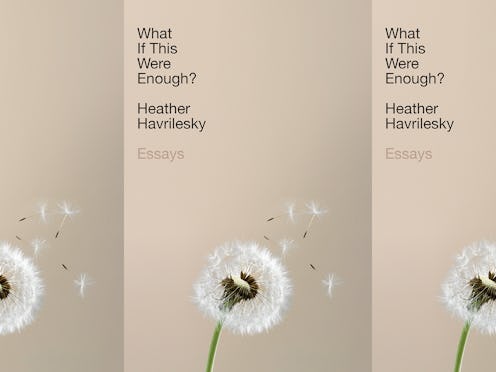Books
This Essay Collection Made Me Rethink What It Means To "Disconnect"

In her popular "Ask Polly" column on The Cut, Heather Havrilesky is used to giving all the answers, but in her new book, the acclaimed critic, memoirist, and advice columnist turns the tables on readers by asking the questions, including the one posed in the title. A sharp, humorous, and heartfelt essay collection that explores our culture's obsession with self-improvement, perfection, and success, What If This Were Enough? asks readers to reconsider their endless quest for the coolest, the biggest, the shiniest new thing, and instead find happiness in what they already have.
What does it take to be happy, and is it even possible to attain in our modern world of constant excess? That is the question at the heart of Havrilesky's new collection of witty, incisive, and powerful essays. Insightful and often brutally honest, What If This Were Enough? forces readers to look at their lifestyles, their possessions, their desires, and even their interactions with others from a different perspective and ask, am I going about this all wrong? Each thought-provoking entry encourages introspection and a bit of soul-searching, but it's "Lost Treasure" that I haven't been able to stop thinking about since I read it.
In "Lost Treasure," Havrilesky remembers a childhood neighbor, an elderly woman who made craft projects out of natural materials she would collect on long walks. As a kid, Havrilesky thought the arrangements were boring, but reflecting back on these bizarre creations as an adult, she remarks just how "exotic" they are. Not because of how they were made — out of bundles of branches or dead driftwood decorated with dried flowers and pieces of moss — but because of the special kind of attention and focus required to find the material to actually make them — attention and focus most of us don't seem capable of anymore.
What If This Were Enough?: Essays by Heather Havrilesky, $17, Amazon or Indiebound
"When I go on walks these days, I listen to podcasts and answer texts and make phone calls. I listen to Kendrick Lamar, who is grateful but also pissed off. That's my territory: gratitude and anger, anger and gratitude. It's an impatient place to live," writes Havrilesky about her own inability to unplug, disconnect, and exist in the moment. It's an inability I am all too familiar with, one I have found myself struggling with more and more these days.
I am lucky enough to live in a place where I can go hiking every day, but no matter how hard I try to leave work, my friends, and the endless news cycle at the forest line, I never quite feel like I'm allowed to be lost in the woods, lost in the moment. As Havrilesky's essay explains so perfectly, "It's hard to live in the moment, to exist locally and think locally and emote locally. Something in my pocket is always buzzing. People far away except quick answers to every passing question. Why do we live this way?"
That's a question I have been asking myself a lot recently. Why do we live this way? Why do we allow ourselves to be constantly bombarded by texts from friends who aren't in front of us, emails about work assignments after hours, news alerts announcing every move the administration makes?
In 2018, it feels impossible to disconnect, and not just because of how prevalent technology, news, and social media are in our lives. Because when we do disconnect, if we do disconnect, it feels like we might miss something crucial while we're away: a breaking story about the Supreme Court nominee that demands outrage, a new immigration policy that deserves protest, a piece of pop culture that requires our personal hot take right away. But do we really need to be informed moment-to-moment about the things happening all around the world, or does that kind of split-screen attention mean we miss out on what is right in front of us?
In "Lost Treasure," Havrilesky asks readers to imagine a different kind of life, one without the constant buzz of a cell phone and the never-ending stream of headlines. "Imagine, instead. a day of quiet wandering," she tells readers. "Imagine tuning in to what's around you, instead of getting distracted by events and sounds and messages that have nothing to do with where you are."
The alternative reality presented in "Lost Treasure" is a promising one in which we are able to turn away from our screens and look out onto the world right in front of us, a world in which life's real treasures are hiding in plain sight. "The more I have, the more I realize that all that matters is the small discoveries, the little interactions, the improvised, messy, glued-together moments that lie at the center of our happiness," writes Havrilesky. "Everything else is just distraction."
But what will it take to shake the distractions? I still don't know, but a leisurely walk in the woods doesn't seem like a bad place to start.